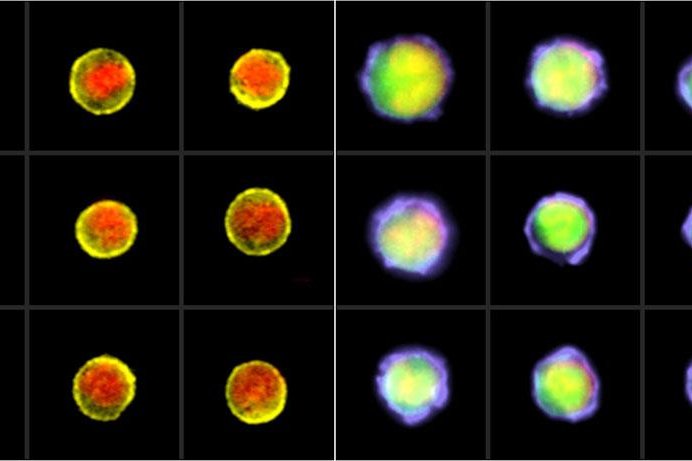Harvard researchers say they've found what could be the first new treatment for acute myeloid leukemia in 40 years: a set of compounds that force undifferentiated leukemia cells, pictured at left, to differentiate, pictured on the right, causing them to die. Photo by Scott Mordecai/Massachusetts General Hospital/Harvard University
CAMBRIDGE, Mass., Sept. 16 (UPI) -- For the first time in about four decades, researchers think they have identified a new method of battle against acute myeloid leukemia, a type of bone marrow cancer that is difficult to treat because of the dangers posed by standard treatment methods.
Rather than bombard AML cells with chemotherapy, researchers at Harvard University found a compound that pushes leukemia cells into a state that eventually causes them to die, according to a study published in the journal Cell.
In AML patients, blood stem cells and blood progenitor cells in marrow don't differentiate into adult white blood cells, instead remaining in an immature state, multiplying and crowding out healthy cells. This limits the amount of healthy blood cells needed for functions of the body.
While chemotherapy can help, it wipes out the immune system and causes other health conditions, some as side effects of the treatment itself and others caused by bacterial and fungal infections. Since the average age of AML patients is 67, this makes the treatment potentially dangerous because of age-related complications.
To avoid this, researchers screened 330,000 compounds, finding 11 that blocked a metabolic enzyme in AML cells, which forced them into a period of fasting -- which normal cells can survive, but cancer cells cannot.
This fasting triggers a change in the undifferentiated cancer cells, including differentiation, that eventually causes them to die.
In tests of the compounds with mice, the researchers found those treated for 10 weeks had a lower number of leukemia stem cells and lived longer. The researchers also report none of the treated animals showed signs of disease progression while being treated.
"We need desperately to find new therapies," David Scadden, chair of the Stem Cell and Regenerative Biology Department at Harvard, said in a press release. "We think that an approach to overcome the differentiation blockade of cancer may be a strategy with broad application and one we should explore for other cancer types."















